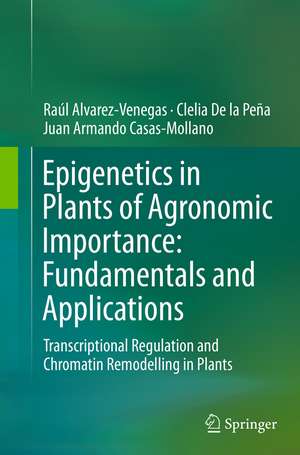Epigenetics in Plants of Agronomic Importance: Fundamentals and Applications: Transcriptional Regulation and Chromatin Remodelling in Plants
Autor Raúl Alvarez-Venegas, Clelia De la Peña, Juan Armando Casas-Mollanoen Limba Engleză Paperback – 17 sep 2016
Preț: 883.90 lei
Preț vechi: 1077.93 lei
-18% Nou
Puncte Express: 1326
Preț estimativ în valută:
169.15€ • 175.60$ • 141.05£
169.15€ • 175.60$ • 141.05£
Carte tipărită la comandă
Livrare economică 22 martie-05 aprilie
Preluare comenzi: 021 569.72.76
Specificații
ISBN-13: 9783319358154
ISBN-10: 3319358154
Pagini: 162
Ilustrații: X, 152 p. 17 illus., 16 illus. in color.
Dimensiuni: 155 x 235 x 9 mm
Greutate: 0.24 kg
Ediția:Softcover reprint of the original 1st ed. 2014
Editura: Springer International Publishing
Colecția Springer
Locul publicării:Cham, Switzerland
ISBN-10: 3319358154
Pagini: 162
Ilustrații: X, 152 p. 17 illus., 16 illus. in color.
Dimensiuni: 155 x 235 x 9 mm
Greutate: 0.24 kg
Ediția:Softcover reprint of the original 1st ed. 2014
Editura: Springer International Publishing
Colecția Springer
Locul publicării:Cham, Switzerland
Cuprins
The role of germinally inherited epialleles in plant breeding.- Epigenetics and heterosis in crop plants.- Epigenetic variation amongst polyploidy crop species.- Histone Phosphorylation in Plants.- Tomato epigenetics: Deciphering the "beyond" genetic information in a vegetable fleshy-fruited crop.- Recent advances in epigenetics on somatic embryogenesis of important agronomical plants.- microRNA expression and regulation during plant Somatic Embryogenesis.- Can epigenetics help forest plants to adapt to climate change?.
Notă biografică
Dr. Raúl Alvarez-Venegas currently works as a full-time Professor-Researcher at the Department of Genetic Engineering, of the Center for Research and Advanced Studies (Cinvestav-Irapuato, México). Dr. Alvarez-Venegas received his Ph.D. in Biochemistry and Molecular Biology from Purdue University (2002). From 2002 to 2006, he conducted postdoctoral work at the University of Nebraska-Lincoln and at Pioneer Hi-Bread, Canada. Dr. Clelia De-la-Peña, was born and raised in México city and move to Mérida Yucatán when she was 12-years-old. She graduated in Biochemistry Engineering from Instituto Tecnológico de Mérida (ITM). After graduating in 2001 she started the postgraduate school getting a Master degree in Plant Science and Biotechnology at Centro de Investigación Científica de Yucatán (CICY) working on a thesis related to somatic embryogenesis and polyamines in coffee. In 2007 she obtained a PhD degree at Colorado State University (CSU), USA. Her first original contribution from her PhD thesis was on Root-microbe communication through protein secretion, which has been highly cited. In 2008, she conducted postdoctoral work at CSU and in 2009 at the Department of Genetic Engineering, of the Center for Research and Advanced Studies (Cinvestav-Irapuato, México). Her scientific productivity is important, with more than fifteen papers and others in the pipeline. Dr. Juan Armando Casas Mollano is a Young Investigator fellow at the Chemistry Institute of the University of Sao Paulo. Dr Casas-Mollano completed his PhD in the Department of Genetics at the University of Dublin in 2004. He then worked as a postdoctoral researcher and later as a Research Assistant Professor at the University of Nebraska-Lincoln from 2004 to 2011. Between 2011 and 2012 he worked as a postdoctoral research assistant at Purdue University. He also holds a postgraduate diploma in statistics from the University of Dublin and a BS in Biology from the National AgriculturalUniversity.
Textul de pe ultima copertă
Over the past decades, chromatin remodelling has emerged as an important regulator of gene expression and plant defense. This book provides a detailed understanding of the epigenetic mechanisms involved in plants of agronomic importance. The information presented here is significant because it is expected to provide the knowledge needed to develop in the future treatments to manipulate and selectively activate/inhibit proteins and metabolic pathways to counter pathogens, to treat important diseases and to increase crop productivity. New approaches of this kind and the development of new technologies will certainly increase our knowledge of currently known posttranslational modifications and facilitate the understanding of their roles in, for example, host-pathogen interactions and crop productivity. Furthermore, we provide important insight on how the plant epigenome changes in response to developmental or environmental stimuli, how chromatin modifications are established and maintained, to which degree they are used throughout the genome, and how chromatin modifications influence each another.
Caracteristici
A much needed and up-to-date book on plant epigenetics Plant epigenetics beyond the model plant systems Epigenetic memory in plants of economical interest Includes supplementary material: sn.pub/extras
